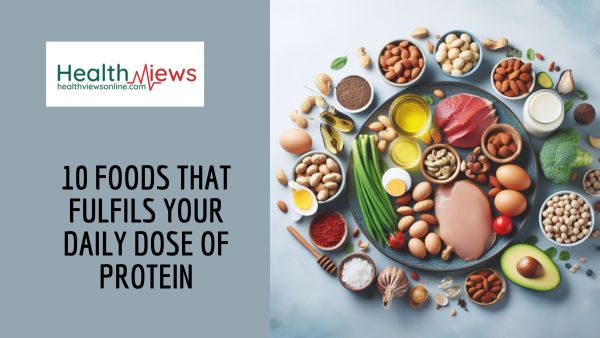Proteins are an extensive category of molecules that are involved in cell structure, immunological function, mobility, chemical reactions, hormone synthesis, and other functions. They are all composed of microscopic building pieces known as amino acids. These are essential, which means your body needs them but cannot produce them on its own, so you must obtain them through your food.
Protein is not only important for your health, but it can also keep you feeling full and content, which helps you maintain healthy body weight. The recommended dietary allowance (RDA) for protein is 0.36 grams (g) per pound of body weight (0.8 g per kilogram).
Also, Read Everything You Wanted To Know About Phosphorus!!!
Here are ten excellent protein-rich foods
1. Eggs
Whole eggs are an amazing source of vitamins, minerals, healthy fats, and antioxidants, as well as a rich amount of easily absorbed protein. A large egg (50 g) has 6.3 g of protein. Source
2. Almonds
Almonds can help your health in a variety of ways, including lowering heart disease risk factors such as high LDL (bad) cholesterol and high blood pressure. Almonds provide 6 g of protein per ounce (28.35 g). Source
Pistachios, which contain 5.73 g of protein per 1-ounce (28.35-g) dose, and cashews, which contain 4.34 g of protein per 1-ounce (28.35-g) dishes, are two more high-protein nuts.
Also, watch Health views web stories: 8 Foods That Fulfills Your Iron Dose
3. Cottage cheese
Cottage cheese is a low-fat, high-protein cheese that is low in calories and fat. It’s high in calcium, phosphorus, selenium, vitamin B12, riboflavin (vitamin B2), and other minerals.
Cottage cheese has 28 g of protein per cup (226 g). Cheddar cheese, which has 3.96 g of protein per 17-g slice, and mozzarella, which contains 6.29 g of protein per 1 ounce (28.35 g), are two other high-protein cheeses.
4. Greek yoghurt
Greek yogurt, often known as strained yogurt, is a thick, protein-rich yogurt. It has a creamy texture and is rich in calcium, vitamin B12, vitamin A, selenium, and zinc, among other nutrients. 19.9 g is provided by one 7-ounce (200-g) container. Source
Other protein-rich yogurt products include unsweetened low-fat yogurt, which contains 11.9 g of protein per 8-ounce (227-g) container, and kefir, which contains 9.21 g of protein per 1 cup (243 mL).
5. Lentils
Lentils are one of the richest sources of plant-based protein, making them a fantastic choice for vegetarians and vegans. They’re also high in fiber, folate, magnesium, potassium, iron, copper, and manganese, among other nutrients. The protein content of 100 g (approximately 1/2 cup) of cooked lentils is 9.02 g. Source
Chickpeas, with 7.05 g of protein per 100 g cooked, and black beans, with 8.86 g of protein per 100 g cooked, are two more high-protein legumes.
6. Fish
Fish is high in protein and contains a variety of vitamins and minerals, including iodine, selenium, and vitamin B12. Protein is abundant in all forms of fish. Half a salmon fillet (124 g) has 30.5 g of protein, while a cod fillet (180 g) contains 41 g of protein. Source
7. Quinoa
Quinoa is classified as a complete protein because it includes all nine essential amino acids that your body cannot make. It does, however, contain insufficient levels of certain amino acids, such as leucine. 1 cup (185 g) cooked quinoa has 8 g of protein. Source
Also, Read Know All About Iodine: Functions, Recommended Amount, Sources, Deficiency,
8. Pumpkin seeds
Pumpkin seeds are high in minerals such as iron, phosphorus, magnesium, and zinc. They’re also high in fiber and plant-based protein. A quarter cup (29.5 g) of pumpkin seeds has 8.8 g of protein. Source
Sunflower seeds, which contain 7.25 g of protein per 1/4-cup (35 g) intake, and flax seeds, which provide 7.5 g of protein per 1/4-cup (42 g) serving, are two other high-protein seeds.
9. Peanuts and peanut butter
Peanuts and peanut butter are high in protein, folate, magnesium, and vitamin E. Peanuts and peanut butter may help you feel full because of their high protein content. A 1-ounce (28.35-g) serving of peanuts contains 7.31 g of protein, while a 2-tablespoon (32-g) amount of smooth peanut butter contains 7.2 g.
10. Chicken breast
If you want to increase your protein intake, chicken breast is a fantastic alternative. Chicken contains a variety of B vitamins as well as minerals such as zinc and selenium, in addition to protein. 26.7 g of protein is included in an 86 g portion of a chicken breast. Source
Getting adequate protein each day is essential for good health. Protein requirements differ from person to person. However, most active persons should ingest 0.54-0.9 g of protein per pound of body weight (1.2-2 g per kg) every day, according to experts. Fortunately, there are numerous high-protein foods available, including both animal and plant-based sources.
Also, watch Health views web stories: 8 Foods That Fulfill Your Vitamin A Dose





